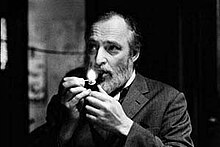Loading AI tools

Asger Oluf Jorn (March 3, 1914 – May 1, 1973) was born in Vejrum, in the northwest corner of Jutland, Denmark and baptized Asger Oluf Jørgensen. In 1946 he changed his name into Asger Oluf Jorn. He was a founding member of the COBRA-group and later of the Situationist International; he was a prolific artist, active organizer and essayist. He felt himself strongly connected to Nordic myths, as well as to modern times.
- sorted chronologically, after date of the quotes about Asger Jorn
- Jorn's role in the Situationist movement (as in COBRA) was that of a catalyst and team leader. Guy Debord on his own lacked the personal warmth and persuasiveness to draw people of different nationalities and talents into an active working partnership. As a prototype Marxist intellectual Debord needed an ally who could patch up the petty egoisms and squabbles of the members. Their quarrels came into the open the moment Jorn's leadership was withdrawn in 1961.. .Finally, 1966-8 saw the vindication of Debord's policy, sustained against every kind of opposition, of adhering rigidly to the uncompromising pursuit of a single-minded plan. When the time came - in Strasbourg in November 1966 and in Paris in May 1968 - Debord was ready, with his two or three remaining supporters, to take over the revolutionary role for which he had been preparing during the last ten years. Incredible as it may seem, the active ideologists ('enragés' and Situationists) behind the revolutionary events in Strasbourg, Nanterre and Paris, numbered only about ten persons.
- Quote of Guy Atkins, Troels Andersen (1977) Asger Jorn, the crucial years 1954-1964, p. 63
- One method [of Jorn] was to work with accidental shapes, and this was to become a lifelong preoccupation. But in the beginning the techniques of Surrealism were put to good use: Collage, frottage, color sprayed on paper with an airbrush or floated on the surface of a bowl of water and lifted off on paper. Another way to break the link between line and plane was by what Arp called the "square-eyed" method or alternately, with Dali, putting one drawing on top of another, using transparent paper. Jorn had availed himself of all these methods and experiments by 1940.
- Quote of Troels Andersen (1985), in Asger Jorn, Silkeborg Kunstmuseum, (translated from Danish by Peter Shiled) pp. 25-31
Wikiwand in your browser!
Seamless Wikipedia browsing. On steroids.
Every time you click a link to Wikipedia, Wiktionary or Wikiquote in your browser's search results, it will show the modern Wikiwand interface.
Wikiwand extension is a five stars, simple, with minimum permission required to keep your browsing private, safe and transparent.

